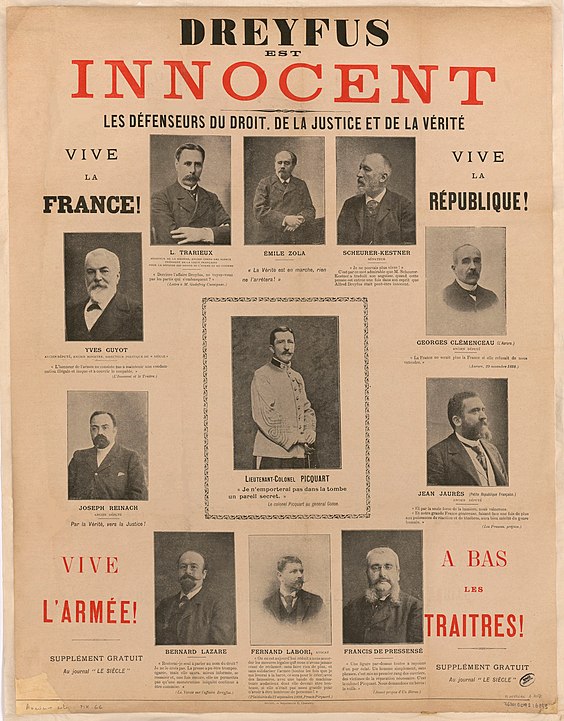130 Years After The Dreyfus Affair: A Push For Recognition

Table of Contents
130 years have passed since the infamous Dreyfus Affair shook France and the world, exposing the dangers of antisemitism, militarism, and injustice within the highest echelons of power. While the case concluded with Dreyfus' exoneration, its legacy continues to resonate, prompting a renewed push for full recognition of its profound impact and a deeper understanding of its enduring relevance. This article explores the lasting implications of the Dreyfus Affair and the ongoing efforts to ensure its lessons are not forgotten.
<h2>The Dreyfus Affair: A Brief Recap</h2>
The Dreyfus Affair, a watershed moment in French history, began in 1894 with the false accusation of treason against Alfred Dreyfus, a Jewish captain in the French Army. This accusation, fueled by rampant antisemitism and a flawed military investigation, led to a deeply unjust trial and his subsequent conviction and deportation to Devil's Island. The evidence against Dreyfus was flimsy at best, based largely on forged documents and prejudiced assumptions. The affair exposed deep-seated antisemitism within the French military establishment and government, highlighting the dangers of unchecked power and the fragility of justice in the face of prejudice.
- False accusation of treason: Dreyfus was accused of leaking military secrets to Germany, a charge that was completely unfounded.
- Role of antisemitism in the framing: Anti-Jewish sentiment played a significant role in the framing and prosecution of Dreyfus. His Jewish faith was used to fuel suspicion and prejudice against him.
- The involvement of the French army and government: The French army actively concealed evidence that proved Dreyfus' innocence, engaging in a cover-up to protect its reputation. High-ranking officials were complicit in the conspiracy.
- Emile Zola's impactful "J'accuse" open letter: Emile Zola's courageous open letter, published in L'Aurore, exposed the injustice of the trial and ignited public debate, galvanizing support for Dreyfus' cause.
- Dreyfus's eventual exoneration and rehabilitation: After years of struggle and public outcry, Dreyfus was finally exonerated in 1906, though the full extent of the injustice inflicted upon him was only acknowledged much later.
<h2>Enduring Legacy of the Dreyfus Affair: Antisemitism and Justice</h2>
The Dreyfus Affair's impact extends far beyond France's borders. It profoundly impacted French society, leading to increased awareness of systemic antisemitism and highlighting the crucial need for legal reforms. The Affair also significantly influenced the Zionist movement, strengthening the resolve for a Jewish homeland where such injustices could not occur. Furthermore, the Dreyfus Affair contributed significantly to the development of modern human rights discourse, emphasizing the importance of due process, fair trials, and the fight against prejudice.
- Increased awareness of systemic antisemitism: The Affair brought the insidious nature of ingrained antisemitism into sharp focus, sparking debates about its roots and consequences.
- Influence on the Zionist movement: The blatant antisemitism displayed during the Dreyfus Affair reinforced the Zionist movement’s arguments for a Jewish state where Jews could be safe from persecution.
- The development of modern human rights discourse: The fight for Dreyfus's exoneration contributed significantly to the development of modern concepts of human rights and the importance of independent judiciaries.
- The importance of due process and fair trials: The Dreyfus Affair became a powerful symbol of the need for impartial justice and the dangers of biased legal systems.
- The ongoing struggle against prejudice and discrimination: The legacy of the Dreyfus Affair serves as a constant reminder of the ongoing struggle against all forms of prejudice and discrimination.
<h3>The Dreyfus Affair and Modern-Day Antisemitism</h3>
The Dreyfus Affair remains chillingly relevant in the 21st century. The rise of antisemitic incidents globally, fueled by online hate speech and extremist ideologies, underscores the enduring need for vigilance and education. Remembering the lessons of the Dreyfus Affair serves as a stark warning against the dangers of complacency and the enduring threat of prejudice.
- Examples of modern antisemitism: From antisemitic attacks to the resurgence of hateful stereotypes in the media and online, modern antisemitism manifests in various forms.
- The need for continued vigilance and education: Combating modern antisemitism requires continuous vigilance, education, and a commitment to challenging prejudice wherever it appears.
- The importance of remembering historical injustices: Remembering the Dreyfus Affair helps us understand the historical roots of contemporary antisemitism and informs strategies for combating it effectively.
<h2>The Push for Recognition: Memorials and Education</h2>
Efforts to commemorate the Dreyfus Affair and educate future generations about its significance are crucial. Several memorials and historical sites related to the Affair exist in France and beyond, while educational programs and initiatives strive to keep its lessons alive. Ongoing research and scholarship continue to shed new light on the complexities of the case, and calls for more comprehensive inclusion of the Dreyfus Affair in educational curricula are gaining momentum.
- Existing memorials and historical sites: Several museums and monuments commemorate the Dreyfus Affair and the individuals involved.
- Educational programs and initiatives: Numerous educational programs and initiatives use the Dreyfus Affair as a case study to teach about antisemitism, justice, and human rights.
- Ongoing research and scholarship: Scholars continue to research and publish works on the Dreyfus Affair, offering new insights into its historical context and enduring significance.
- Calls for more comprehensive inclusion in educational curricula: Advocates are pushing for greater inclusion of the Dreyfus Affair in school curricula to ensure younger generations learn from this crucial historical event.
<h2>Conclusion</h2>
The Dreyfus Affair, even 130 years later, remains a potent symbol of the dangers of unchecked power, prejudice, and injustice. Its legacy compels us to remain vigilant against antisemitism and all forms of discrimination. The ongoing push for greater recognition of the Dreyfus Affair is crucial, not only to honor the memory of Alfred Dreyfus but also to ensure that the lessons learned from this pivotal moment in history are never forgotten. Let's continue to learn from the Dreyfus Affair and work towards a more just and equitable world. We must actively participate in remembering and understanding the lasting impact of the Dreyfus Affair to prevent similar injustices from occurring again. Understanding the Dreyfus Affair is a critical step in combating antisemitism and promoting justice for all.

Featured Posts
-
 Southamptons Kyle Walker Peters A Leeds United Target
May 25, 2025
Southamptons Kyle Walker Peters A Leeds United Target
May 25, 2025 -
 Ferrari 296 Speciale Apresentacao Do Motor Hibrido De 880 Cv
May 25, 2025
Ferrari 296 Speciale Apresentacao Do Motor Hibrido De 880 Cv
May 25, 2025 -
 Nicki Chapman Shares A Look At Her Stunning Chiswick Garden
May 25, 2025
Nicki Chapman Shares A Look At Her Stunning Chiswick Garden
May 25, 2025 -
 Memorial Day 2025 Air Travel Peak And Off Peak Dates
May 25, 2025
Memorial Day 2025 Air Travel Peak And Off Peak Dates
May 25, 2025 -
 Pertimbangan Investasi Pada Mtel Dan Mbma Implikasi Penambahan Msci Small Cap
May 25, 2025
Pertimbangan Investasi Pada Mtel Dan Mbma Implikasi Penambahan Msci Small Cap
May 25, 2025
Latest Posts
-
 Analysis Of Sean Penns Stance On Dylan Farrows Accusations Against Woody Allen
May 25, 2025
Analysis Of Sean Penns Stance On Dylan Farrows Accusations Against Woody Allen
May 25, 2025 -
 The Sean Penn Woody Allen Dylan Farrow Controversy A Deeper Look
May 25, 2025
The Sean Penn Woody Allen Dylan Farrow Controversy A Deeper Look
May 25, 2025 -
 Woody Allen Sexual Assault Allegations Sean Penns Doubts
May 25, 2025
Woody Allen Sexual Assault Allegations Sean Penns Doubts
May 25, 2025 -
 Understanding Frank Sinatras Four Marriages Wives Love And Legacy
May 25, 2025
Understanding Frank Sinatras Four Marriages Wives Love And Legacy
May 25, 2025 -
 Sean Penns Response To Dylan Farrows Sexual Assault Claims Against Woody Allen
May 25, 2025
Sean Penns Response To Dylan Farrows Sexual Assault Claims Against Woody Allen
May 25, 2025
